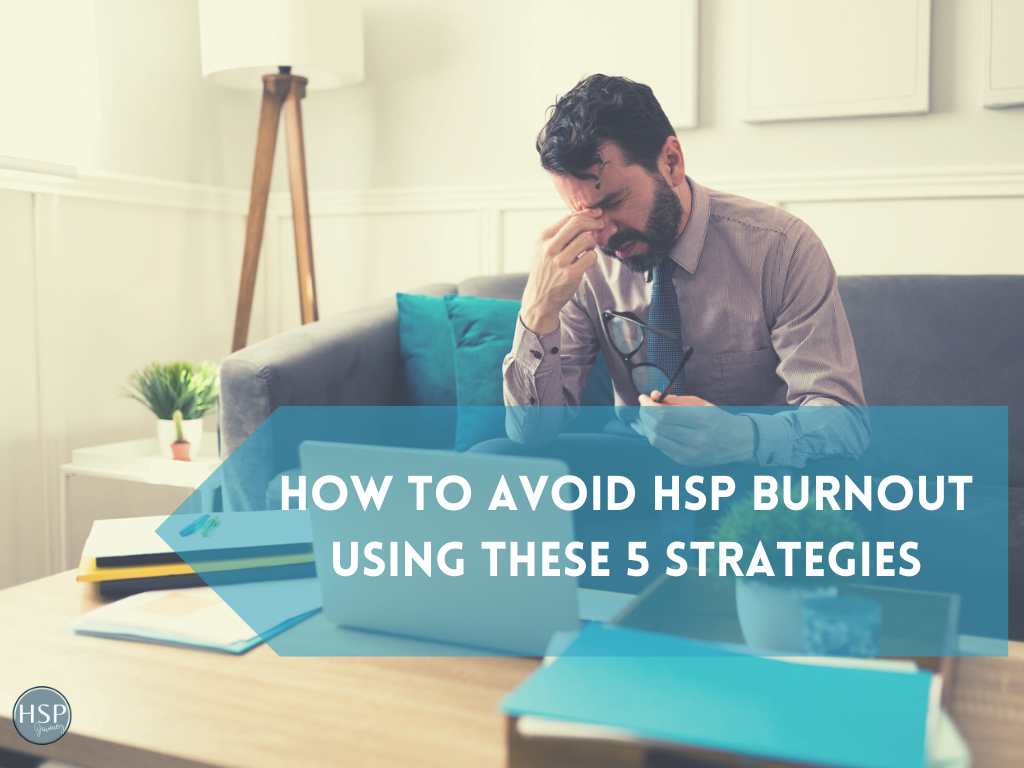As a Highly Sensitive Person (HSP), you might experience overwhelming emotions and heightened empathy. This unique trait, also known as sensory processing sensitivity, can sometimes lead to excessive stress and burnout if not managed properly. In this article, we will talk about effective ways to avoid HSP burnout and maintain a healthy balance in your busy life.
Navigating day-to-day life as an HSP can be challenging due to your heightened sensitivity to environmental stimuli and the emotions of others. Taking care of yourself is especially important, as you may be more prone to feeling overwhelmed and experiencing physical and emotional exhaustion. Fortunately, there are several strategies you can employ to reduce the likelihood of burnout and ensure that you’re better equipped to handle the demands of daily living.

In the upcoming sections, we will discuss various self-care tips and practices that have been proven to help HSPs maintain their well-being and avoid burnout. By incorporating these techniques into your daily routine and making some simple lifestyle adjustments, you can create a more sustainable and enjoyable life as a Highly Sensitive Person.
Table of Contents
Why Do HSPs Feel Burnout More Acutely?
You may experience burnout more intensely than others because of your unique trait of sensitivity. One reason is that your nervous system is more sensitive to stress, which can cause prolonged periods of stimulation and overstimulation. This heightened level of stress then leads to a higher chance of experiencing burnout.
Your increased sensitivity to both external and internal stimulation plays a significant role in feeling overwhelm. For example, loud noises, bright lights, emotional situations, and large crowds can all be sources of overstimulation for HSPs. Since your nervous system processes this stimulation more effectively, it can become challenging to find relief from the constant input.
To avoid burnout, it’s essential to recognize the signs and manage stress effectively. You can do this by setting boundaries, practicing self-care, seeking support from like-minded individuals or professionals, and maintaining routines that can alleviate overstimulation and provide some sense of calm. By incorporating these strategies into your daily life, you can better cope with stress and reduce the likelihood of experiencing burnout.
Remember, as an HSP, it’s essential to listen to your body’s signals and give yourself permission to recharge when needed. By understanding the unique way your nervous system processes stimulation and stress, you can take proactive steps to prevent burnout and maintain a balanced, healthy life.
HSP Burnout in Different Areas of Life
It is crucial to understand how HSP burnout can manifest in different areas so that you can better manage your sensitivities and maintain a balanced lifestyle.
In your personal life, setting boundaries and prioritizing self-care is essential. Schedule some alone time regularly to recharge and reduce overstimulation. Enjoy calming activities like reading, meditation, or spending time in nature. Engaging in creative hobbies like painting or writing can also be beneficial in managing HSP-related stress.
When it comes to work, HSPs may feel overwhelmed by the demands and sensory input of their environment. To avoid burnout, make a conscious effort to reduce sensory overload by creating a comfortable and soothing workspace. Consider flexible work arrangements, like remote or part-time work, to help maintain balance and prevent exhaustion.
Relationships can also be challenging for HSPs, as they tend to feel emotions more deeply. Maintain open, honest communication with your loved ones to express your needs and avoid misunderstandings. Developing empathy and understanding in your relationships can go a long way in easing emotional burdens for HSPs.
As an HSP parent, remember that taking care of your own well-being is crucial to that of your children. While your deep compassion and empathy make you a caring and supportive parent, you must also set aside time for yourself to recharge and avoid burning out.
When it comes to physical health, self-care practices like exercise and proper nutrition can significantly benefit HSPs. Be mindful of your caffeine intake and incorporate foods that help reduce stress. Regular physical activity, such as yoga or walking, can help in managing your energy levels and maintaining balance.
Lastly, mental health is paramount for HSPs, as your sensitive nature may make you more vulnerable to anxiety or depression. Prioritize self-care practices that nurture your emotional well-being, such as journaling, mindfulness techniques, and seeking professional support when needed.
Overall, HSP burnout can manifest in different areas of your life, making it essential to understand and implement self-care strategies tailored to your specific needs. By taking care of yourself both physically and mentally, you can maintain balance, reduce stress, and lead a fulfilling life as an HSP.
Introverted Versus Extroverted HSPs
It’s crucial to understand the differences between introverted and extroverted HSPs, as their needs and coping mechanisms can vary.
If you’re an introverted HSP, you likely feel more comfortable in quiet environments and enjoy solitude. However, you may still experience overstimulation, which can manifest as stress, fatigue, and even insomnia. To alleviate these issues, try incorporating some downtime into your daily routine, focusing on activities that bring you inner peace and relaxation. Breathing exercises, meditation, or spending time in nature can contribute to reducing your stress levels.
On the other hand, if you’re an extroverted HSP, social interaction might energize you. Nevertheless, you still need to take care of yourself and be aware of the potential for overstimulation. In contrast to introverted HSPs, you might experience boredom and under-stimulation when you don’t have enough social engagement. To maintain your ideal balance, schedule some interaction with friends or attend group activities that interest you.
It’s also worth noting that both introverted and extroverted HSPs might feel misunderstood at times. To overcome this, build a support system of people who understand and appreciate your sensitivity, such as family, friends, or colleagues. Communicating your needs and feelings can help foster healthy relationships and ease any feelings of isolation.
No matter your HSP type, prioritize self-care, and know your limits. Pay attention to your body’s signals to recognize when you need rest or social interaction. By understanding the differences between introverted and extroverted HSPs, you’ll be better equipped to avoid burnout and maintain overall well-being.
Healthy Boundaries to Avoid HSP Burnout
As an HSP, it’s essential to establish healthy boundaries to prevent burnout. Let’s look at some helpful strategies to achieve this.
Strategy #1 to Avoid HSP Burnout: Practice Self-Care
First and foremost, make an effort to practice self-care. By setting aside time for activities that bring you joy and relaxation, you can help reduce the impact of stress in your life. Try incorporating creative hobbies, physical exercise, or mindfulness techniques into your daily routine. This will help recharge your emotional batteries and foster a balanced lifestyle.
Strategy #2 to Avoid HSP Burnout: Set Clear Boundaries
Creating clear and consistent boundaries is another crucial component of avoiding HSP burnout. Communicate your needs and limitations to those around you, particularly in your workplace and personal relationships. This can include setting limits on your availability, such as developing a regular work schedule and avoiding overcommitting to social engagements. Remember it is alright to say no when needed.
Strategy #3 to Avoid HSP Burnout: Build a Support Network
Building a support network is also essential in managing stress and maintaining healthy boundaries. Surround yourself with friends and family who understand your HSP traits and respect your limits. If you find that certain individuals consistently cross your boundaries, consider addressing the issue or potentially distancing yourself from those relationships.
Strategy #4 to Avoid HSP Burnout: Utilize Resources Well
Utilize tools and resources to help manage your sensitivity. There are many helpful resources online and offline, such as books, blogs, and support groups that can provide valuable insights into coping with HSP burnout. Additionally, consider getting professional guidance from a therapist or counselor who specializes in HSP issues.
Strategy #5 to Avoid HSP Burnout: Be Mindful to Avoid Overload
Finally, be mindful of time pressure and avoid overloading your schedule with tasks and responsibilities. Highly sensitive individuals often need more time to process information and recover from the daily challenges of life. Prioritize the most important tasks and don’t hesitate to delegate or ask for help when needed.
In conclusion, by setting healthy boundaries, practicing self-care, building a support network, utilizing helpful tools, and being mindful of time pressure, you will be able to better cope with the demands of being a highly sensitive person and avoid burnout.
Seeking HSP Coaching for Help
As a highly sensitive person (HSP), you might experience hsp burnout more frequently than others. During these times, seeking professional help can be tremendously beneficial. Thankfully, there are HSP coaches and therapists available to support and guide you through challenging moments.
One powerful way to avoid HSP burnout is by pursuing coaching specifically tailored for highly sensitive people. These trained professionals understand HSP’s unique set of experiences and vulnerabilities, so they can provide invaluable insights and customized strategies for managing stress and preventing burnout. Regular sessions with an HSP coach can help you better understand your sensitivities and empower you with tools to handle them effectively.

Looking for an HSP-Trained coach to help you align your life with your priorities?
Through my Highly Sensitive Person (HSP) certification with the Nickerson Institute, as well as being an HSP, I offer HSP coaching to develop specific goals around your HSP needs. We HSPs frequently deal with anxiety and overstimulated nervous systems that prevent us from achieving peace and attaining our life goals. HSP coaching with me includes a detailed review of your sensitivities and a mutually-desired plan for growth and management of this superpower to shift negativity and begin seeing yourself as the hero of your own story. (Affordable monthly coaching begins at $150/month.)
It’s also essential to surround yourself with a support system that appreciates your HSP qualities. Confide in friends, family members, or join HSP-specific online communities to share your experiences and seek encouragement. You’ll find understanding, camaraderie, and practical advice from people who share your traits and are eager to help.
Lastly, do not hesitate to seek professional help if you’re struggling. HSP therapists are available when you need someone with expertise in your specific needs. They’re trained to help you navigate through difficult situations and provide guidance to manage stress and avoid burnout. Remember, reaching out for support is not a sign of weakness but a courageous step towards a happier and healthier life.
By seeking HSP coaching, creating a support system, and asking for help when you need it, you’re equipping yourself with the resources to reduce stress, avoid burnout, and thrive as a highly sensitive person.
Avoiding HSP Burnout in the Future
Avoiding burnout as a highly sensitive person (HSP) is essential for your mental and emotional well-being. By incorporating a few key habits and strategies, you can build resilience and prevent HSP burnout. Let’s explore some steps you can take.
First, try to establish a routine of meditation. Meditation can help you reduce anxiety, depression, and improve the quality of your sleep. Spend at least a few minutes each day practicing mindfulness or a meditation technique that suits your needs.
Next, prioritize self-care. As a highly sensitive person, you need to take breaks and remove yourself from overstimulating environments. Make sure you’re getting enough sleep, exercise, and maintain a regular schedule to optimize your energy.
Developing a support system is a crucial aspect of avoiding HSP burnout. Surround yourself with people who understand your needs and can provide emotional support. You may also benefit from joining HSP support groups or online communities.
Don’t forget to integrate creativity into your daily life. Engaging in creative activities like painting, writing, or playing music can be therapeutic for HSPs and help combat burnout. Pursue your passions and make time for creative pursuits that bring you joy.
Additionally, learn assertiveness techniques. Communicate your needs effectively and set boundaries to protect yourself from overwhelming situations. Remember that it’s okay to say “no” when you need to preserve your energy.
Finally, practice gratitude daily. Cultivating a regular gratitude practice can help you focus on the positives in your life and reduce the impact of stress on your well-being. Take some time each day to reflect on what you’re grateful for, and consider maintaining a gratitude journal.
By integrating these habits and strategies into your daily life, you can effectively mitigate stress and avoid HSP burnout in the future. Remember that it’s essential to be proactive and prioritize self-care to ensure your mental and emotional well-being.
Looking for HSP Tools to Thrive in a Chaotic World?
The modern world is often overwhelming and stressful for those of us with sensitive nervous systems. Many of us have suffered from the challenges of high stress, anxiety, sensory overload, and mental health and physical health issues. Fortunately, after years of working with and researching Highly Sensitive People (HSPs), Julie Bjelland has developed many tools that have not only helped her but thousands of HSPs all over the world move out of survival mode living and into thriving. In this free webinar, she’ll share the tools that HSPs have found the most life-changing. Her goal is to help you live to your fullest potential because the world needs you.
Join this free webinar and get tools to help you thrive as an HSP!
Frequently Asked Questions
What are some effective coping strategies for HSPs?
As a highly sensitive person, you might find it helpful to identify and engage in practices that can help you manage overstimulation. Some effective coping strategies include regular quiet time, practicing mindfulness or meditation, and engaging in physical activities like jogging or yoga. Knowing which activities help you recharge and dedicating time for them can significantly benefit your well-being.
How can HSPs maintain a healthy work-life balance?
To maintain a healthy work-life balance, HSPS must set boundaries between personal and professional life. Scheduling regular breaks during the workday, creating a comfortable workspace, and allocating time for hobbies or non-work-related activities can help you combat burnout. Make sure to communicate your needs to your employer to create an optimal working environment.
What self-care techniques can help prevent HSP burnout?
Self-care is a critical component in preventing HSP burnout. Consider incorporating healthy eating habits, regular exercise, and adequate sleep into your routine. Additionally, explore relaxation techniques like deep breathing and mindfulness that can help reduce stress and anxiety. Setting boundaries, both personally and professionally, is another vital aspect of self-care as it helps you maintain a balanced lifestyle.
How can HSPs manage stress and anxiety effectively?
For HSPs, it’s important to have a stress management toolbox to effectively handle overstimulation. Techniques like mindfulness, deep breathing, or practicing relaxation exercises can help you manage stress and anxiety. Remember, what works for one person might not work for you, so experiment with different techniques to find what calms and grounds you best.
What are some practical tips for HSPs to set boundaries?
Setting boundaries is essential in maintaining your overall well-being and avoiding burnout. Some practical tips include:
- Clearly communicating your needs and limits to others
- Prioritizing your emotional health
- Being assertive about your personal space
- Implementing a self-care routine
- Getting comfortable saying no when needed
Acknowledge your unique sensitivities and ensure that the boundaries you set support a balanced and fulfilling life.
How can HSPs navigate relationships to avoid emotional exhaustion?
HSPs often absorb the emotions of those around them, which can lead to emotional exhaustion. To avoid this, it’s essential to develop strong communication skills and be open about your needs. Surround yourself with supportive and understanding individuals who respect your boundaries. Prioritize self-care and attend to your emotional well-being regularly. This will help create healthy and positive relationships without draining your emotional energy.
Be sensitive, be free
*This post contains affiliate links and I will be compensated if you make a purchase after clicking on my links*





[…] important to recognize your triggers and develop strategies to cope with them. This may include setting boundaries, practicing self-care, and embracing your sensitivity as a strength. By acknowledging your needs […]